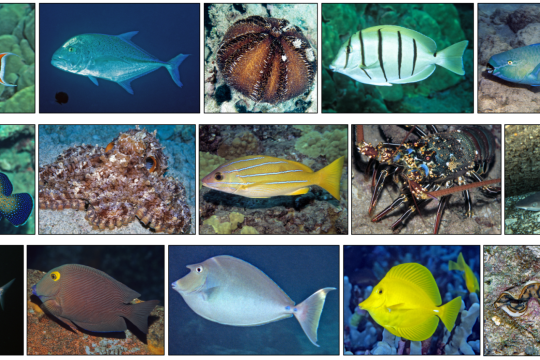Small Giant Clam
Tridacna maxima
Protected Status
Quick Facts
About the Species
Somewhat paradoxically, Tridacna maxima is known commonly as the small giant clam. It is the most cosmopolitan of the giant clam species with an expansive range that extends from the central Pacific all the way into the Red Sea. T. maxima tends to inhabit shallow waters of coral reefs and atoll lagoons. The mantle of T. maxima is often brilliantly colored with some variation of blues, greens, and browns.
Scientific Classification
| Kingdom | Animalia | Phylum | Mollusca | Class | Bivalvia | Order | Cardiida | Family | Cardiidae | Genus | Tridacna | Species | maxima |
|---|
Last updated by NOAA Fisheries on 07/24/2024
Featured News
 A grant project in Guam is setting up giant clam aquaculture in two southern villages, Inalåhan and Malesso. Giant clams are a culturally important species in Guam, where they’re also regulated due to overharvesting. Credit: David Burdick
A grant project in Guam is setting up giant clam aquaculture in two southern villages, Inalåhan and Malesso. Giant clams are a culturally important species in Guam, where they’re also regulated due to overharvesting. Credit: David Burdick
 Fifteen of the 83 species included in the Pacific Islands vulnerability assessment. From left to right: Acanthurus achilles, Caranx melampygus, Tripneustes gratilla, Acanthurus triostegus, Scarus rubroviolaceus, Cephalopholis argus, Octopus cyanea, Lutjanus kasmira, Panulirus penicillatus, Triaenodon obesus, Selar crumenophthalmus, Ctenochaetus strigosus, Naso unicornis, Zebrasoma flavescens, Tridacna maxima. Photo credit: Bruce Mundy.
Fifteen of the 83 species included in the Pacific Islands vulnerability assessment. From left to right: Acanthurus achilles, Caranx melampygus, Tripneustes gratilla, Acanthurus triostegus, Scarus rubroviolaceus, Cephalopholis argus, Octopus cyanea, Lutjanus kasmira, Panulirus penicillatus, Triaenodon obesus, Selar crumenophthalmus, Ctenochaetus strigosus, Naso unicornis, Zebrasoma flavescens, Tridacna maxima. Photo credit: Bruce Mundy.
Management Overview
NOAA Fisheries is proposing to list Tridacna maxima as threatened throughout its range based on the similarity of appearance* of certain products derived from this species (e.g., meat that has been removed from its shell, shell carvings, and pearls) to those derived from Hippopus hippopus, H. porcellanus, T. derasa, T. gigas, T. mbalavuana, and T. squamosina. To mitigate a significant law enforcement challenge associated with this “similarity of appearance” concern, NOAA Fisheries is proposing to prohibit the import and export of such derivative parts and products of T. maxima into and from the United States. Please see the proposed rule for additional information regarding this proposed listing.
* Section 4(e) of the Endangered Species Act authorizes the treatment of a species, subspecies, or population segment as endangered or threatened if: “(a) such species so closely resembles in appearance, at the point in question, a species which has been listed pursuant to such section that enforcement personnel would have substantial difficulty in attempting to differentiate between the listed and unlisted species; (b) the effect of this substantial difficulty is an additional threat to an endangered or threatened species; and (c) such treatment of an unlisted species will substantially facilitate the enforcement and further the policy of this Act.
Key Actions and Documents
More Information
Last updated by NOAA Fisheries on 07/24/2024